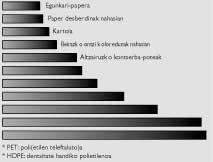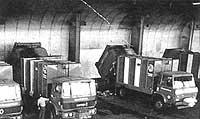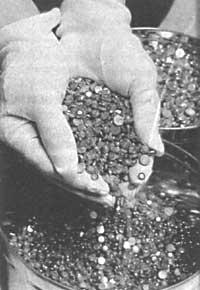Where do we go?
1994/04/01 Irazabalbeitia, Inaki - kimikaria eta zientzia-dibulgatzaileaElhuyar Fundazioa Iturria: Elhuyar aldizkaria
Sixteen years have passed since I studied Pollution Chemistry. We were told for several hours about urban solid waste and among the civilized pathways for its treatment three great: controlled landfills, incineration and recycling. In all of them they told us that the best was recycling and so I learned. We were clearly told that incineration was only a temporary and temporary “solution”, until recycling was socialized and controlled landfills could not be organized.
However, those I heard sixteen years ago have recently reminded me that the Diputación Foral de Gipuzkoa proposes in the press the construction of a incinerating plant to solve the problem of solid waste. Sixteen years ago. “Great gatxeek!” I thought among myself “Ho’i dek asmatua!”

The lords of the Diputación forgive the audacity, it is not the way. As a solution for the treatment of urban solid waste, the incineration plant in 1994 is a retrospective plant. We must look to the future, not backwards.
Incineration does not solve the problem. You can hide it because it reduces landfills. It's about making the ostrich. It produces air pollution, among others. 30.000 tons of solid waste burned and 30 tons of pollutants in the atmosphere. Among the contaminants are dioxins and PCBs. It's not a midnight goat cough! On the other hand, the carbon dioxide (CO2) that is generated in all combustion cannot be discarded. In addition, it promotes a culture of despicable consumption, “use and pull”.
Let us be courageous the lords of the Deputation. We encourage you to propose future solutions. Selective collection and recycling are the real solution to the treatment of urban solid waste. No one doubts about it. I know that it is a laborious work, that we must change the prejudices and customs of the years of citizenship and of the authorities, that the selective collection and recycling require a great work of socialization. Raising awareness and educating citizens.
We have to build a new culture of consumption. That requires money and time. However, it is cheaper than the 24.000 million pesetas needed by the incinerator and much smarter. Do not hesitate!
Britain has proposed for the year 2000 to recycle 50% of urban solid waste. Britain is not at the peak of ecologism. What is the objective of the Diputación de Gipuzkoa? In what proportion has it been proposed to recycle the waste? Do you intend to develop resources or legislation to reduce waste generation? Does it have a plan to make consumption habits more ecological?
More similar questions can be asked. Do you have a response?

Gai honi buruzko eduki gehiago
Elhuyarrek garatutako teknologia





